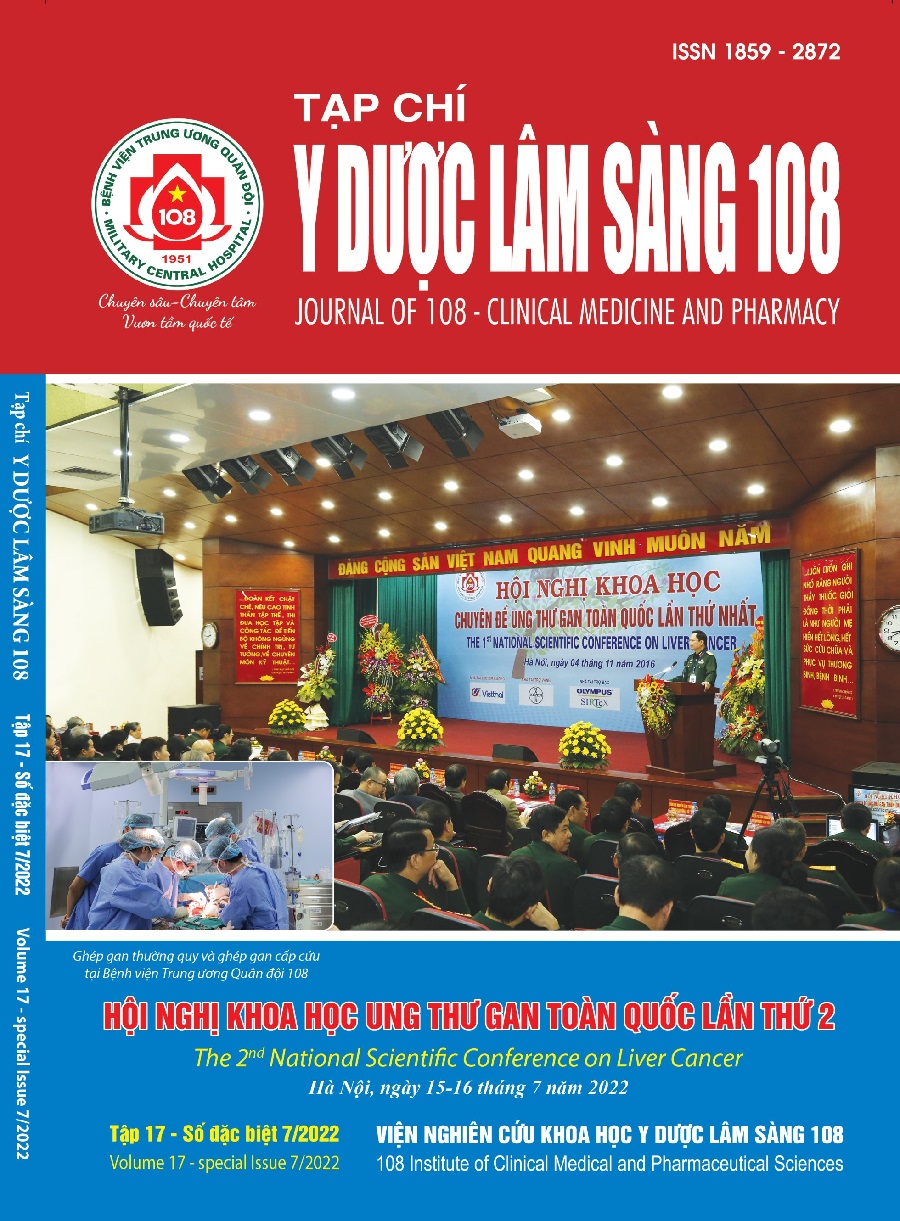Evaluation of the results treatment of unresectable hepatocelular carcinoma by radio-frequency ablation with anesthesia and untrasound guided
Main Article Content
Keywords
Abstract
Objective: The study aimed to evaluate the results of treatment of hepatocellular carcinoma that cannot be resected by radiofrequency ablation with anesthesia and ultrasound guidance at Hue Central Hospital. Subject and method: Prospective, interventional, uncontrolled study including 33 patients with confirmed diagnosis of hepatocellular carcinoma (HCC) who cannot be resected treated with radio frequency ablation from January 2020 to June 2021. Present some clinical characteristics of patients with HCC; evaluated the results of treatment of HCC that cannot be resectable with RFA under anesthesia under ultrasound guidance with the following results: Complete tumor destruction rate, tumor recurrence rate, progression-free time and no recurrence, overall survival time of patients in the study. Result: Including 29 men and 4 women, the male:female ratio was 7.25:1. The mean age was 64.06 ± 11.21 (26 - 81). Total 39 tumors/ 33 patients, average size: 2.5 ± 0.9cm. The rate of complete tumor destruction in the first RFA was 89.7%, and 96.9% after 2 RFA. The rate of no tumor recurrence was 84.8%. Progression-free and recurrence-free disease time 7.7 ± 5.3 months, overall survival time 11.4 ± 3.9 months. Conclusion: Radiofrequency ablation can bring good treatment effect and long survival time for patients with unresectable HCC.
Article Details
References
2. Nguyễn Đình Song Huy và cộng sự (2013) Hiệu quả của đốt nhiệt cao tần (RFA) trên ung thư biểu mô tế bào gan không đáp ứng hoàn toàn với thuyên tắc hóa trị qua động mạch (TACE). Hội Gan mật Thành phố Hồ Chí Minh.
3. Bộ Y tế (2020) Hướng dẫn chẩn đoán và điều trị ung thư biểu mô tế bào gan. Số 3129/QĐ-BYT.
4. GLOBOCAN (2020) truy cập ngày 22/10/2021 tại trang web https://gco.iarc.fr/today/online-analysis-table.
5. Livraghi T et al (2008) Sustained complete response and complications rates after radiofrequency ablation of very early hepatocellular carcinoma in cirrhosis: Is resection still the treatment of choice?. Hepatology 47(1): 82-89.
6. Lu LH et al (2020) Treatment optimization for recurrent hepatocellular carcinoma: Repeat hepatic resection versus radiofrequency ablation. Cancer Med 9(9): 2997-3005.
7. Omata M et al (2017) Asia-Pacific clinical practice guidelines on the management of hepatocellular carcinoma: A 2017 update. Hepatol Int 11(4): 317-370.
8. Shiina S et al (2012) Radiofrequency ablation for hepatocellular carcinoma: 10-year outcome and prognostic factors. Am J Gastroenterol 107(4): 569-77; quiz 578.
9. Vivarelli M et al (2004) Surgical resection versus percutaneous radiofrequency ablation in the treatment of hepatocellular carcinoma on cirrhotic liver. Ann Surg 240(1): 102-107.
10. Zhou Y et al (2010) Meta-analysis of radiofrequency ablation versus hepatic resection for small hepatocellular carcinoma. BMC Gastroenterol 10: 78.
 ISSN: 1859 - 2872
ISSN: 1859 - 2872
